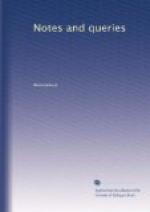While on the subject of Pope, I will make a note (as I have not seen it noticed by his commentators), that the well-known line,
“The proper study of mankind is man,”
is literally from Charron (De la Sagesse, I. i. ch. 1.)—
“La vraye science et
le vray etude de l’homme c’est
l’homme.”
F.F.B.
[We may add, that in the Aldine edition of Pope, which was produced under the editorial superintendence of the Rev. A. Dyce, the lines are given as quoted from the Times, and without any various reading. See vol. ii. p. 55.]
Angels’ Visits.
Campbell’s famous line,
“Like angels visits, few and far between,”
has been clearly shown by a correspondent in another paper, to be all but copied from Blair:—
——“like
an ill-used ghost
Not to return;—or
if it did, its visits
Like those of angels, short
and far between.”
Blair’s Grave.
But the same phrase, though put differently, occurs in a religious poem of Norris of Bemerton, who died in 1711:—
“But those who soonest
take their flight,
Are the
most exquisite and strong,
Like angels visits,
short and bright,
Mortality’s
too weak to bear them long.”
WICCAMECUS.
Extract from Parish Register of North Runcton, Norfolk.
Sir,—As a pendant to the extracts from the register of East Peckham, Kent, in your third number, I send the following, which I copied some time ago from one of the register books of the parish of North Runcton, Norfolk, and which may prove interesting to some of your readers.
C.W.G
“Jun. 12. 1660.
“Reader,—Lest whatever pseudography (as there is much thereof) occurring to thy intentionall or accidentall view of the following pages in this book should prove offensive to thee, I thought good to give thee an account of what hath occasioned the same, viz. In the woful days of the late usurper, the registring of births, not baptisms, was injoyned and required, to give a liberty to all the adversaries of Pedobaptisme, &c., and, besides some circumstances, too unhandsome for the calling and person of a minister, were then allso annexed to him that was to keep a register of all, &c.; and so it came to passe, that persons of no learning, for many places, were chosen by y’e parish, and ministers declined the office.
NATH ROWLES.”
The Norman Crusader.
“The Norman Crusader,” in the horse-armoury in the Tower of London, or a part of it, came from Green’s Museum. He obtained the hauberk from Tong Castle. At the dispersion of the Museum, the hauberk was purchased by Bullock, of Liverpool (afterwards of the Egyptian Hall), in whose catalogue for 1808 it appears as a standing figure, holding a brown bill in the right hand, and resting the left upon a heater shield.




